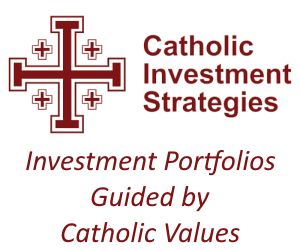Column: The Catholic Investor
The US Conference of Catholic Bishops published the first version of Socially Responsible Investment Guidelines in 1986. Last November (2021) saw the latest update.
From the beginning, the bishops have wanted to earn a reasonable rate of return and invest based on Catholic moral principles. A reasonable rate of return is one that matches the market or allows the investor to meet their financial responsibilities.
What does it mean to invest by Catholic moral principles?
Simply put: Avoid evil and do good.
According to the newly revised guidelines, one should not invest in companies that are involved in activities falling into the following five categories.
1. Protecting Human Life
- Abortion
- Euthanasia and Assisted Suicide
- In Vitro Fertilization
- Human Embryonic Stem Cells
- Fetal Cells
- Human Cloning
2. Promoting Human Dignity
- Pornography or Commercial Sex Exploitation
- Gender Change
- Contraception (if more than 10% of revenues)
3. Enhancing the Common Good
- Production or Sale of Weapons of Mass Destruction
- Manufacture of Firearms (unless for hunting or legitimate military or law enforcement)
- Gambling
- Tobacco
- Cannabis
- Media that Resists Adopting Policies in Harmony with Church Teaching
4. Pursuing Economic Justice – No Mandatory Exclusions
5. Saving our Global Common Home
- No Remediation of Biodiversity Destruction
- Depletion or Degradation of Water Supply Without Mitigation
- Extraction of Resources without Compliance with the Extractive Industries Transparency Initiative
- Non-compliance with the UN Global Compact Items #7-#9 (concerning environmental responsibility)
Additionally, when a company steps over the line morally, investors should talk to the company’s top management in an effort to remedy the moral issue. This is what the bishops mean by advocacy.
So, as an individual investor, how do you put the guidelines into practice?
The hard truth is that it’s very difficult to do by yourself.
For example, if you are invested in a broad stock market index, you will inevitably be exposed to companies that are involved in prohibited activities.
What qualifies as a “broad stock market index”?
Any fund labeled as a total stock market, large cap, mid-cap, small cap, S&P 500, S&P 400, S&P 600, Russell 1000, Russell 2000, or Russell 3000 index will have exposures that contravene the Guidelines. All such index funds are “passive” funds, meaning that they try only to mimic the index, not out-perform it like an “active” fund. If you invest in an actively managed fund, it is still highly likely that you own companies that violate the bishops’ guidelines.
You could try to avoid certain industries such as pharmaceuticals, medical devices, defense, tobacco, cannabis, media, gaming, mining, and oil and gas. That would go a long way toward compliance, but it is a very broad-brush approach and would unnecessarily exclude a large number of investable companies. 
If an individual investor were aware of moral issues at a company, possible actions would include writing letters to corporate management, attending the annual stockholders meeting, and supporting corporate resolutions that would address the issue at hand. Unfortunately, none of these activities are likely to be as productive as sitting down with members of the C-suite for a discussion.
Or, rather than undertake the commitment of time and energy that the above would require, you could find a reliable professional to guide you. Just be sure that professional follows both aspects of the USCCB guidelines!
Thomas "Tom" Carroll, CFA, is the president of Catholic Investment Strategies, a position in which he has passionately enjoyed serving since 2012. Prior to this position,... MORE »



You must be logged in to post a comment.